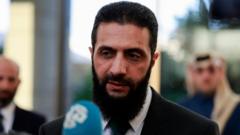Holding new elections in Syria may take as long as four years, according to rebel leader Ahmed al-Sharaa, who recently shared this timeline during a broadcast interview. His remarks mark the first concrete estimate regarding the electoral process since his faction, Hayat Tahrir al-Sham (HTS), was instrumental in the fall of former President Bashar al-Assad's regime.
In his interview with Saudi state broadcaster Al Arabiya, Sharaa also indicated that drafting a new constitution could require an additional three years. He mentioned that significant improvements and changes to public services might not be apparent for up to a year as the country transitions from the Assad regime.
Sharaa, who is recognized in the international arena as Abu Mohammed al-Jolani and is assumed to be leading the newly formed authorities, highlighted the necessity for rebuilding the country’s legal framework and conducting a comprehensive population census to facilitate credible elections.
Some skepticism has arisen regarding HTS governance of Syria’s ethnically diverse populace, as the group originally operated as a jihadist faction intending to establish an Islamic law-based state. However, Sharaa has stated that HTS intends to dissolve itself during an upcoming national dialogue conference, although specific details of the event remain vague. This conference could serve as a litmus test for the new leadership's ability to unify the nation following over a decade of civil unrest.
Sharaa defended the transitional government's recent appointments amidst criticism, insisting that these appointments were crucial and aimed at inclusivity. Syria is home to an array of religious and ethnic communities, including Kurds, Armenians, Christians, and Druze, among others, with a commitment to safeguarding minority rights being a pivotal focus for the new leadership.
In a related crackdown, nearly 300 individuals associated with the Assad loyalists have been detained over the past week, as reported by a UK-based war monitor. Among those arrested were informants, pro-Assad fighters, and former military personnel, with local populations allegedly assisting in these operations. Syrian state news agency Sana confirmed these detentions targeted members of the Assad militia and included the confiscation of weapons and ammunition.



















